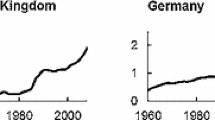Abstract
This article argues that domestic social conflicts are a key to understanding why growth rates lack persistence and why so many countries have experienced a growth collapse since the mid-1970s. It emphasizes, in particular, the manner in which social conflicts interact with external shock on the one hand, and the domestic institutions of conflict-management on the other. Econometric evidence provides support for this hypothesis. Countries that experienced the sharpest drops in growth after 1975 were those with divided societies (as measured by indicators of inequality, ethnic fragmentation, and the like) and with weak institutions of conflict management (proxied by indicators of the quality of governmental institutions, rule of law, democratic rights, and social safety nets).
Similar content being viewed by others
References
Alesina, Alberto, and Allan Drazen. (1991). "Why are Stabilizations Delayed?" American Economic Review 82, 1170–1188.
Alesina, Alberto, and Dani Rodrik. (1994). "Distributive Politics and Economic Growth." Quarterly Journal of Economics 109, 465–490.
Barro, Robert, and Jong-Wha Lee. (1994). "Data Set for a Panel of 138 Countries." Manuscript, Harvard University.
Barro, Robert. (1998). "Determinants of Economic Growth: A Cross-Country Empirical Study." NBERWorking Paper No. 5698.
Benabou, Roland. (1996). "Inequality and Growth." in NBER Macroeconomics Annual 1996. Cambridge: National Bureau of Economic Research.
Ben-David, Dan, and David H. Papell. (1997). "Slowdowns and Meltdowns: Postwar Growth Evidence from Seventy-four Countries." NBER Working Paper 6266.
Bijan Aghevli, and Jorge Marquez-Ruarte. (1985). A Case of Successful Adjustment: Korea's Experience During 1980–84. IMF Occasional Paper 39, Washington, DC.
Celasun, Merih, and Dani Rodrik. (1989). "Debt, Adjustment, and Growth: Turkey." In J. Sachs and S. Collins (eds.), Developing Country Debt and Economic Performance, Vol. 3, Country Studies: Indonesia, Korea, Philippines, Turkey (bk. 4). Chicago: University of Chicago Press.
Collins, Susan, and Barry Bosworth. (1996). "Economic Growth in East Asia: Accumulation Versus Assimilation." Brookings Papers on Economic Activity 2, 135–191.
Deininger, Klaus, and Lyn Squire. (1996). "ANewData Set Measuring Income Inequality." World Bank Economic Review 565–591.
Easterly, Williams. (1997). "The Ghost of Financing Gap: How the Harrod-Domar Model Still Haunts Development Economics." World Bank.
Easterly, William, Michael Kremer, Lant Pritchett, and Larry Summers. (1993). "Good Policy or Good Luck? Country Growth Performance and Temporary Shocks." Journal of Monetary Economics 32, 459–483.
Easterly, William, and Ross Levine. (1996). "Africa's Growth Tragedy: Policies and Ethnic Divisions." World Bank.
Gwartney, John et al. (1996). Economic Freedom Around the World, 1975–95. Toronto: Fraser Institute.
Hall, Robert, and Charles Jones. (1996). "The Productivity of Nations." Stanford University.
Helliwell, John. (1994). "Empirical Linkages Between Democracy and Economic Growth." British Journal of Political Science 24, 225–248.
Inglehart, Ronald. (1994). Codebook for World Values Survey. ICPSR Study No. 6160, Institute for Social Research, University of Michigan, Ann Arbor, MI.
Jaggers, K., and T. R. Gurr. (1995). "Tracking Democracy's Third Wave with Polity III Data." Journal of Peace Research 32, 469–482.
Knack, Stephen, and Philip Keefer. (1995). "Institutions and Economic Performance: Cross-Country Tests Using Alternative Institutional Measures." Economics and Politics 207–228.
Knack, Stephen, and Philip Keefer. (1996). "Does Social Capital Have an Economic Payoff? A Cross-Country Investigation." Manuscript.
Kurian, George Thomas. (1991). The New Book of World Rankings (3rd ed.). New York: Facts on File Books.
Mauro, Paolo. (1995). "Corruption and Growth." Quarterly Journal of Economics 681–712.
Ozler, Sule, and Dani Rodrik. (1992). "External Shocks, Politics, and Private Investment: Some Theory and Empirical Evidence." Journal of Development Economics 39, 141–162.
Persson, Torsten, and Guido Tabellini. (1994). "Is Inequality Harmful for Growth?" American Economic Review 84, 600–621.
Pritchett, Lant. (1997). "Economic Growth: Hills, Plains, Mountains, Plateaus, and Cliffs." Paper, World Bank.
Rodrik, Dani. (1997). "Democracy and Economic Performance." Paper, Harvard University.
Rodrik, Dani. (1998a). "Where Did All the Growth Go? External Shocks, Social Conflict and Growth Collapses." NBER Working Paper 6350.
Rodrik, Dani. (1998b). "Why Do More Open Economies Have Bigger Governments?" Journal of Political Economy 106, 997–1032.
Sachs, Jeffrey. (1985). "External Debt and Macroeconomic Performance in Latin America and Asia." Brookings Papers on Economic Activity 2, 523–573.
Sachs, Jeffrey, and AndrewWarner. (1995). "Economic Reform and the Process of Global Integration." Brookings Papers on Economic Activity 1, 1–118.
Sachs, Jeffrey, and Andrew Warner. (1997). "Sources of Slow Growth in African Economies." Harvard Institute for International Development.
Simonsen, Mario Henrique. (1988). "Price Stabilization and Incomes Policy: Theory and the Brazilian Case Study." In Michael Bruno et al., (eds.), Inflation Stabilization: The Experience of Isreal, Argentina, Brazil, Bolivia, and Mexico. Cambridge: MIT Press.
Tornell, Aaron, and Philip Lane. (1999). "The Voracity Effect." American Economic Review 89, 22–46.
Tornell, Aaron, and Andres Velasco. (1992). "The Tragedy of the Commons and Economic Growth: Why Does Capital Flow from Poor to Rich Countries?" Journal of Political Economy 100, 1208–1231.
Author information
Authors and Affiliations
Rights and permissions
About this article
Cite this article
Rodrik, D. Where Did All the Growth Go? External Shocks, Social Conflict, and Growth Collapses. Journal of Economic Growth 4, 385–412 (1999). https://doi.org/10.1023/A:1009863208706
Issue Date:
DOI: https://doi.org/10.1023/A:1009863208706




